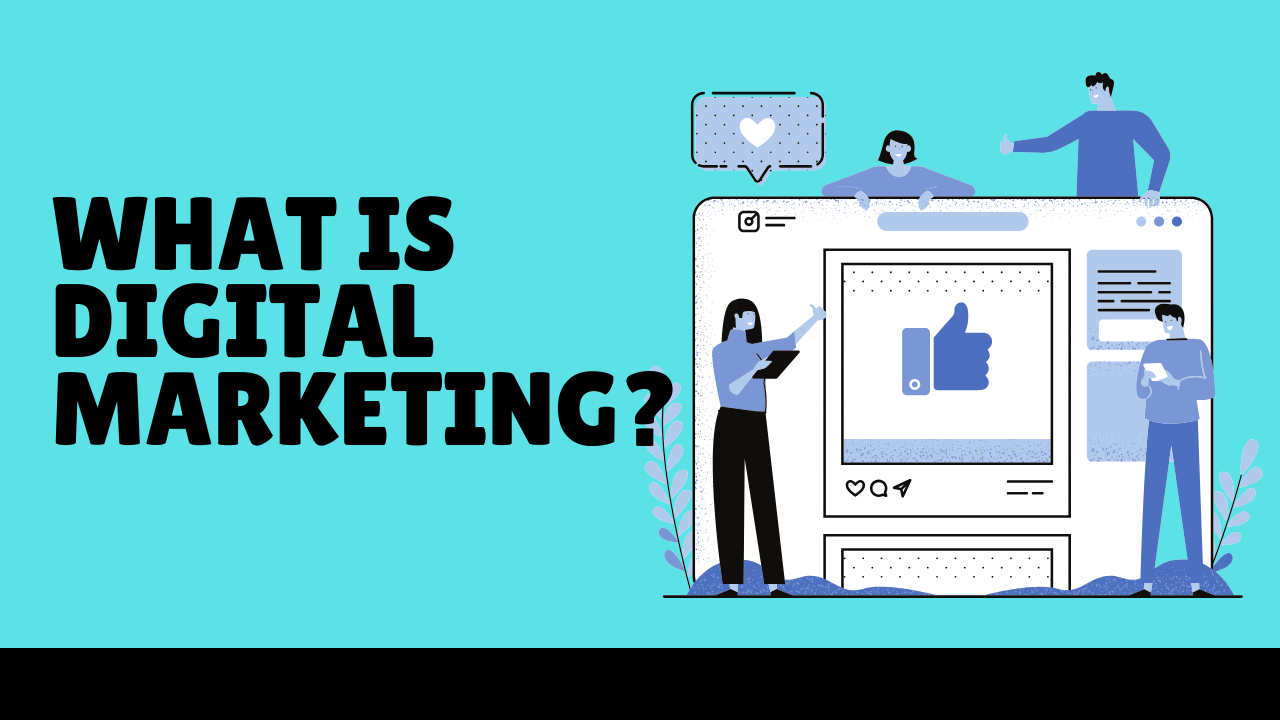What is digital marketing?
Digital marketing, also known as online marketing, utilizes the internet and digital technologies to promote products and services to potential customers.
It encompasses various forms, including online video, display ads, search engine marketing, paid social ads, social media posts, email marketing, and text and multimedia messages.
One of the key advantages of digital marketing is its ability to reach a wide and diverse audience, while also providing businesses with valuable data and feedback. Additionally, it allows for the measurement of campaign effectiveness and return on investment.
In comparison to traditional marketing methods like print, radio, or television, digital marketing offers several benefits.
Firstly, it is more cost-effective and flexible, enabling businesses to adjust their budget and strategy in real-time based on data and performance.
Secondly, it provides a more interactive and engaging experience for customers, allowing businesses to communicate directly and create personalized and relevant content.
Lastly, digital marketing is highly measurable and accountable, enabling businesses to track and analyze various metrics such as impressions, clicks, conversions, and revenue.
How do I get started with digital marketing?
To begin your journey in digital marketing, follow these steps:
1. Establish your own website: A website is a crucial asset for any digital marketer as it showcases your skills, portfolio, and personal brand.
2. Select a specific digital marketing channel to focus on: With numerous channels available, such as SEO, PPC, social media, email, and content, it can be overwhelming to learn them all at once. Instead, choose one channel that aligns with your interests and goals, and master it first.
3. Expand your knowledge about your chosen digital marketing channel: Utilize online resources like blogs, podcasts, videos, courses, and books to gain a deeper understanding.
Platforms like Coursera, Udemy, Skillshare, or edX offer a wide range of courses on various digital marketing topics. Additionally, follow influential figures and experts in the field on social media platforms.
4. Put your learning into practice: The most effective way to learn digital marketing is through hands-on experience.
Apply what you have learned to your own website or offer your services to friends, family, or local businesses.
Engage in online communities such as Reddit, Quora, or Facebook groups to participate in discussions, answer questions, and share your work.
5. Familiarize yourself with free digital marketing tools: Take advantage of the numerous free tools available to assist you in your digital marketing efforts. Tools like Google Analytics, Google Search Console, Google Ads, Facebook Ads, Mailchimp, Ahrefs, and others can aid in tasks such as keyword research, competitor analysis, website optimization, campaign creation, and performance measurement.
6. Explore freelance opportunities in marketing: Once you have gained experience and confidence in digital marketing, consider seeking freelance opportunities online. Platforms like Upwork, Fiverr, or Freelancer can connect you with clients who require digital marketing services.
Additionally, create your own professional profile to showcase your expertise.
You may also read What is SocialGood App and how is it elevating social impact through everyday actions?
What are some examples of digital marketing?
Examples of digital marketing include:
Social media marketing can be achieved organically through the publication of relevant and valuable content, or through paid advertisements that target specific demographics, interests, behaviors, etc.
– Search engine optimization (SEO): Enhancing the visibility and ranking of a website or web page in the unpaid results of search engines such as Google, Bing, Yahoo, etc. SEO involves optimizing the content, design, structure, and technical aspects of a website or web page to make it more relevant and user-friendly for both search engines and users.
Additionally, SEO encompasses activities like keyword research, competitor analysis, link building, and performance evaluation.
– Search engine marketing (SEM): Employing paid advertising on search engines like Google, Bing, Yahoo, etc., to promote a website or web page to the intended audience.
SEM entails creating and managing ads that appear on search engine results pages (SERPs) when users search for specific keywords or phrases. It also involves bidding on keywords, setting a budget, and measuring the performance and return on investment (ROI) of the advertisements.
You may also read ySence review-How do I make money from ySense in 2023?
What is digital marketing? Let us see the below FAQs
FAQs
What are the key components of a digital marketing strategy?
A clear vision, a detailed plan, and a budget are essential components of digital marketing.
What is the significance of social media marketing in digital marketing?
In the digital era, social media marketing plays a crucial role in connecting with and involving your intended audience. Additionally, it is a budget-friendly approach to creating brand recognition, increasing website traffic, and generating potential customers and revenue.
How can mobile marketing be integrated into a digital marketing strategy?
Incorporate mobile marketing into your digital approach through the optimization of your website for mobile devices, the development of content specifically tailored for mobile users, the implementation of mobile advertisements, and the utilization of location-based marketing techniques.
What is the role of remarketing in digital marketing and how does it work?
Remarketing is an effective strategy for cultivating potential customers and stimulating meaningful interactions. By displaying tailored advertisements to individuals who are already acquainted with your brand, it increases the likelihood of them engaging with your offerings.
What strategies should be employed for effective competitor analysis in digital marketing?
Identify and analyze the digital presence of your competitors, utilizing tools to collect data and evaluate your performance. Formulate a strategic plan to distinguish your business from others.


9 thoughts on “What is digital marketing?”